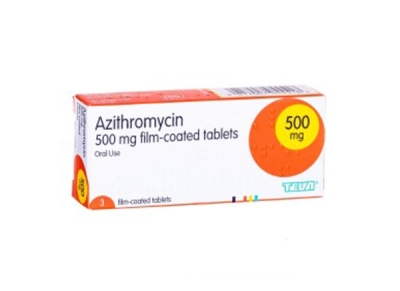Azithromycin is an antibiotic that belongs to the macrolide family. When you take azithromycin, it stops bacteria from creating proteins they need to stay alive. This kills off the bacteria and gives your immune system time to clear them from your body.
Azithromycin 250mg Tablets is a first line, fast-acting antibiotic used to treat traveller’s diarrhoea, which is ideal if you are travelling to Asia, South America, Africa or the Middle East. It is an antibiotic that kills diarrhoea-causing bacteria and reduces the symptoms and duration of this illness, especially when taken with loperamide - a treatment to help reabsorb water from the large intestine.
Azithromycin is the preferred antibiotic for treating travellers' diarrhoea in South Asia (India, Pakistan) or South East Asia (Thailand, Laos, Cambodia, Vietnam etc.). In other parts of the world, the antibiotic Ciprofloxacin is preferred.
Azithromycin can effectively reduce the duration of your traveller’s diarrhoea, as well as the symptoms associated with it. Azithromycin is a short course of antibiotics that will kill the causative bacteria and resolve most cases of traveler's diarrhoea within 48 – 72 hours. This effectiveness can be enhanced by the anti-diarrhoea drug loperamide. Symptoms should begin to improve within 24 hours of taking Azithromycin.
Traveller’s diarrhoea medications are used in an ‘off-label’. Antibiotics such as Azithromycin are prescribed for conditions, or circumstances that are outside of the license also known as ‘off-label’. Prescribing ‘off-label’ is common practice by healthcare professionals to ensure a medication can safely benefit as many patients as possible. This is always based on updated information and evidence since the product first became available.
You should start taking Azithromycin as soon as symptoms of traveller’s diarrhea occur. These include diarrhea, sickness, nausea and stomach cramps.
Take one tablet a day for 3 days. You should always continue the course until it is complete unless otherwise directed by a doctor.
You must complete the course of azithromycin tablets you are prescribed, even if you feel better, to prevent recurrent infections and possible resistance.
Always use this medication exactly as your clinician has told you. Check with our clinical team or your GP or pharmacist if you are not sure.
Medicines and their possible side effects can affect individual people in different ways. The following are some of the side effects that are known to be associated with this medicine. Just because a side effect is stated here, it does not mean that all people using this medicine will experience that or any side effect.
Common side effects of azithromycin may include:
- Nausea
- Diarrhoea or vomiting
- Lack of appetite
- Headaches
- Dizziness
- Feeling tired
- Altered taste
If you experience any of the following serious side effects, you should seek immediate medical help:
- Chest pains or a faster or irregular heartbeat
- Yellow skin or eyes, or pale bowel movements combined with dark urine. These indicate problems with the gallbladder or liver.
- Tinnitus, loss of hearing or vertigo
- Severe abdominal or back pain
- Bloody diarrhea which is severe and long-lasting
For full information on side effects and correct use, see the patient information leaflet. If any side effects concern you, or you are experiencing any of the side effects mentioned in the patient information leaflet whilst taking this medication, please contact our clinical team or speak to your GP.
Do not take Azithromycin tablets if:
- You have liver, kidney, or heart problems.
- You have low levels of potassium or magnesium.
- You develop symptoms of another infection.
- You take any derivatives of ergot such as ergotamine (for migraines).
- You have muscle weakness, myasthenia gravis.
- You have neurological or psychiatric problems.
You should seek medical advice in any of the following cases, or if any other symptoms occur that you are concerned about:
- If you have a high temperature (fever).
- If you have blood in your stools (faeces).
- If it is difficult to get enough fluid because of severe symptoms: frequent or very watery stools or repeatedly being sick (vomiting).
- If the diarrhoea lasts for more than 3 or 4 days.
- If you have started antibiotic medication yourself and the diarrhoea does not start to improve within three days of treatment.
- If you are elderly or have an underlying health problem such as diabetes, inflammatory bowel disease, or kidney disease.
- If you have a weakened immune system because of, for example, chemotherapy treatment, long-term steroid treatment, or HIV infection.
- If you are pregnant.
- If an affected child is under the age of 6 months.
- If you develop any of the symptoms of severe dehydration including profound loss of energy or enthusiasm (apathy), weakness, confusion, fast heart rate, producing very little urine, coma, which may occur.
Get emergency medical help if you have signs of an allergic reaction to this medication. These include:
- Hives
- Dizziness
- Fast or pounding heartbeats
- Wheezing
- Difficult breathing
- Swelling of your face, lips, tongue, or throat.
It is important that you let us know which prescription, over-the-counter medicines and recreational drugs you are currently taking. You must also tell us about any other medical conditions that you currently have (or had in the past). This will help us ensure the prescribed medication is safe and appropriate for you to take.
For full information on warnings, medication interactions and contraindications, refer to the Patient Information Leaflet. Please read all packaging and the Patient Information Leaflet before taking any new medicine and inform our clinical team or your GP of medicines you are taking or intend to take.







